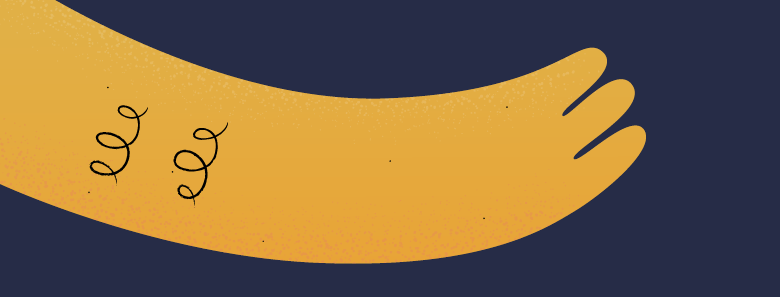The Unpredictability of Squamous Cell Carcinoma
I’ve had skin cancer since 1995. Early on, my skin cancer seemed pretty predictable-- every couple of years, I’d be in my plastic surgeon's office making preparations for the removal of several areas of basal cell cancer. I went a stretch of time where I didn’t have any new cancerous areas, but then they started showing up again, along with squamous cell skin cancer.
My appointment with a plastic surgeon
Unfortunately, when they started showing up, I had a really terrible health insurance policy so I was unable to get them treated. Once I got better insurance and had built up some vacation time at work so I could be off for recovery, I made an appointment with my plastic surgeon.
Sudden bleeding and scabbing
Two days before surgery, I looked in the mirror in the morning and I noticed dried blood on my face. I had a few places on my face that had been bleeding and scabbing which my doctor was going to remove, but this was on the tip of my nose. And the day before, I had nothing on the tip of my nose. While this was bothersome, I planned on mentioning it to my doctor on the day of surgery.
My first squamous cell skin cancer
The morning of surgery, my doctor had me point out everything to him that needed to be removed. He compared it with the body map he had made in his office to make sure we would be getting everything.
As I pointed out the areas, he circled each one on me with a purple marker. The picture had 23 purple circles on my body – I looked pretty funny. He counted the circles and told me we had ended up with one extra purple mark. I explained that the place on the tip of my nose had just shown up two days prior. He assumed that one would be squamous cell because they tend to show up rather quickly. And, unfortunately, pathology during surgery confirmed he was correct. This was my first squamous cell skin cancer.
Squamous cell carcinoma recurrence
Over the next two years, while I had other basal cell areas, I had no other squamous cell areas.....until November 2017.
I realized while at work one afternoon that an area on my chest felt painful, and after work, I saw that I had a new bump on it that wasn’t there the day before. It wasn’t bleeding or scabbing, though, and I was more bothered by the pain of it.
Waited for my scheduled skin check
I already had a regular skin check scheduled with my dermatologist in a few weeks, so I decided to wait until that appointment to have it looked at. And honestly, within a week I was ready to call her to have her look at it sooner because it was that painful. Every time it rubbed against my clothing, it hurt. When I turned over at night while I was sleeping, it hurt and the pain woke me up.
During the appointment, when I told my doctor it appeared out of nowhere and it hurt, she told me she thought it was squamous cell skin cancer because they tend to appear suddenly. She biopsied it, and when the results came back as squamous cell, we scheduled surgery. During the surgery, I asked her why it had hurt so much, and she said that was typical of squamous cell areas-- they grow rather suddenly and become a ‘placeholder’ of space in a place they don’t belong.
Do not wait to have painful new areas checked
Squamous cell skin cancer can be unpredictable. My first squamous cell area did not hurt, but it bled. My second squamous cell area did not bleed, but it hurt. If you have an area appear suddenly and it doesn’t go away within a relatively short period of time, please make an appointment to have it looked at.
Squamous cell carcinoma can spread to your tissue, bones, and lymph nodes, making it harder to treat. Squamous cell is more dangerous than basal cell, and early diagnosis and treatment are best.

Join the conversation